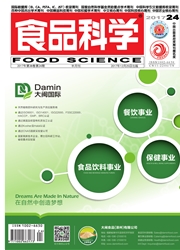

 中文摘要:
中文摘要:
本研究探讨了天然大豆分离蛋白(SPI)的体外胃蛋白酶消化过程,以及热处理对该消化过程的影响。SDS—PAGE分析表明,天然SPI的大豆球蛋白最易为胃蛋白酶所消化,而β-伴大豆球蛋白则较难。β-伴大豆球蛋白的不同亚基对胃蛋白酶消化的敏感程度也有所不同,其中α-亚基最为敏感。TCA,NSI法分析显示,在一定蛋白浓度下,随酶/底物之比的增加,天然SPI受胃蛋白酶的作用释放氮的过程呈现出较为典型的酶浓度依赖性。另外,不同热处理对SPI的体外消化过程产生不同的影响。一定的干热处理(80℃,30~60rain)几乎不影响SPI的体外胃蛋白酶消化过程,而同样条件下的湿热处理则显著提高胃蛋白酶及胰蛋白酶对SPI的消化效果。这结果意味着SPI的体外消化效果取决于其变性程度,热变性程度越高,其消化效果越好。
 英文摘要:
英文摘要:
The in vitro digestibility of soy protein isolates (SPI) and the effects of thermal treatments were investigated. SDS-PAGE analysis showed that, glycinin of SPI was the most easily digested by pepsin, and β-eonglyeinin was the most difficult. In all the subunits of β-conglycinin, the α -subunits were the most susceptive subunits. TCA-NSI analysis indicated that, at a Certain protein concentration, the nitrogen release of SPI by pepsin during the enzyme incubation was dependent upon the enzyme concentration applied. In addition, the in vitro digestibility of SPI was affected by different thermal treatments. The dry heat-treatment (i.e., at 80℃ for 30~60min) nearly did not affect the in vitro digestibility by pepsin, while under the same conditions, the wet heat-treatments could remarkably improve the digestive extent of pepsin and trypsin upon SPI. This result suggested that the in vitro digestibility of SPI depended on its extent of denaturation.
 同期刊论文项目
同期刊论文项目
 同项目期刊论文
同项目期刊论文
 期刊信息
期刊信息
